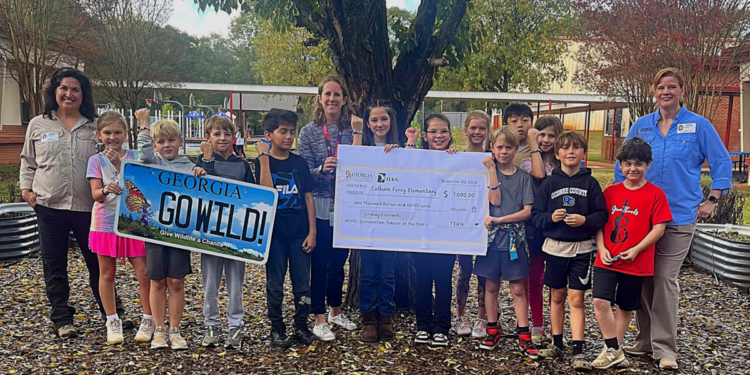Innovating Education: Colham Ferry Elementary’s Lyndsay Goeckeritz Receives Conservation Teacher Award
A Commendable Achievement in Environmental Education
Lyndsay Goeckeritz, a dedicated fourth-grade educator at Colham Ferry Elementary in Watkinsville, has been honored with the prestigious 2024-25 Conservation Teacher of the Year grant by the Georgia Department of Natural Resources. This recognition stems from her imaginative “Stream Sleuths” initiative, which motivates students to explore water quality and stream ecology.
The Georgia Department of Natural Resources recently announced that Goeckeritz’s innovative proposal for investigating a local creek earned her school a generous $1,000 grant. This funding is part of an annual award conferred upon exemplary public or private school teachers in grades K-5 throughout Georgia who showcase outstanding creativity and commitment in life sciences education. The financial support is channeled through The Environmental Resources Network (TERN), a collaborative group devoted to assisting the Wildlife Conservation Section.
Engagement Through Outdoor Learning
Linda May, outreach coordinator for the Wildlife Conservation Section, praised Goeckeritz’s project for its commitment to sustainable outdoor learning imbued with scientific inquiry. “Her plan emphasizes hands-on experiences combined with data collection,” stated May. “Students will engage with curriculum concepts in an exciting and impactful manner while nurturing their respect and responsibility towards natural resources.”
As part of this transformative endeavor, 75 fourth-grade students will delve into studying Porters Creek’s water quality and ecological dynamics. Their exploration involves creating leaf packs to place within the creek to attract macroinvertebrates—organisms that play crucial roles in aquatic ecosystems. By employing identification keys, students will determine which species are present; some organisms’ sensitivity levels can also indicate pollution levels by calculating water quality index scores based on their presence or absence.
This invaluable data will periodically be shared with Georgia Adopt-a-Stream as part of community conservation efforts. Furthermore, students are tasked with producing informative materials that outline their project findings for peers and local stakeholders.
Grant Funding Impact
The grant received by Goeckeritz plays an essential role in equipping her classroom with stream ecology kits along with other necessary supplies vital for conducting biological assessments. Without such support from TERN’s funding efforts, this educational initiative would not have been feasible.
“I am incredibly thankful to receive this conservation award; it empowers me to enliven environmental education among my students,” expressed Goeckeritz. “Your commitment strengthens our future generation’s ability as stewards of our environment.”
Supporting Wildlife Sustainability
Coordinating this grant involves input from staff within the Wildlife Conservation Section as well as oversight from TERN board members who meticulously review applications each year. Established in 1992 as a nonprofit organization, TERN focuses on bolstering financial resources available for state wildlife initiatives.
Through its comprehensive strategies encompassing education, research initiatives, and habitat management practices, Wildlife Conservation aims to protect native species not subject to hunting or fishing regulations while also safeguarding rare flora and critical ecosystems across Georgia—a mission paramount to increasing public appreciation for nature within communities statewide.
Support comes primarily through grants coupled with donations from individuals passionate about wildlife conservation efforts; fundraising activities such as selling specialty license plates featuring iconic state symbols like bald eagles or monarch butterflies further supplement these endeavors.
This article highlights how dynamic educational projects like “Stream Sleuths” foster scientific inquiry among young learners while supporting vital ecological studies aimed at preserving America’s natural heritage for generations yet unborn.






